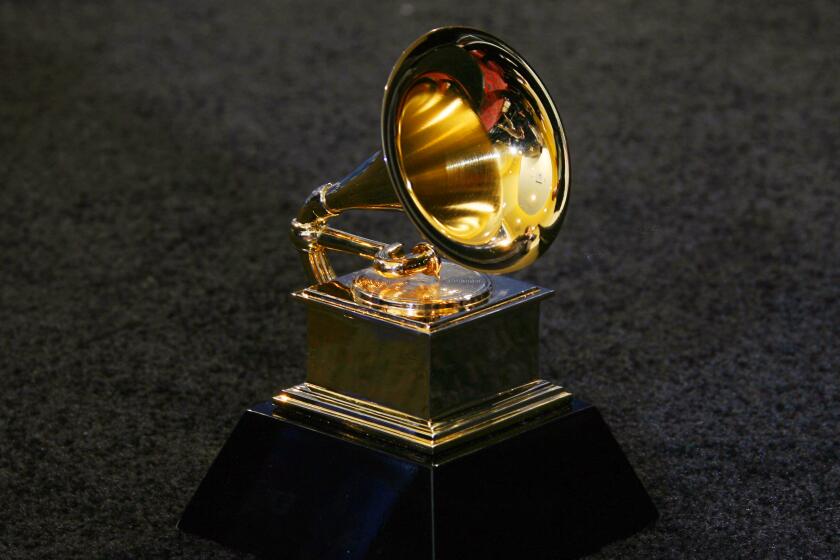2022 Grammy nominations: Absent a clear favorite (and secret committees), something for everyone
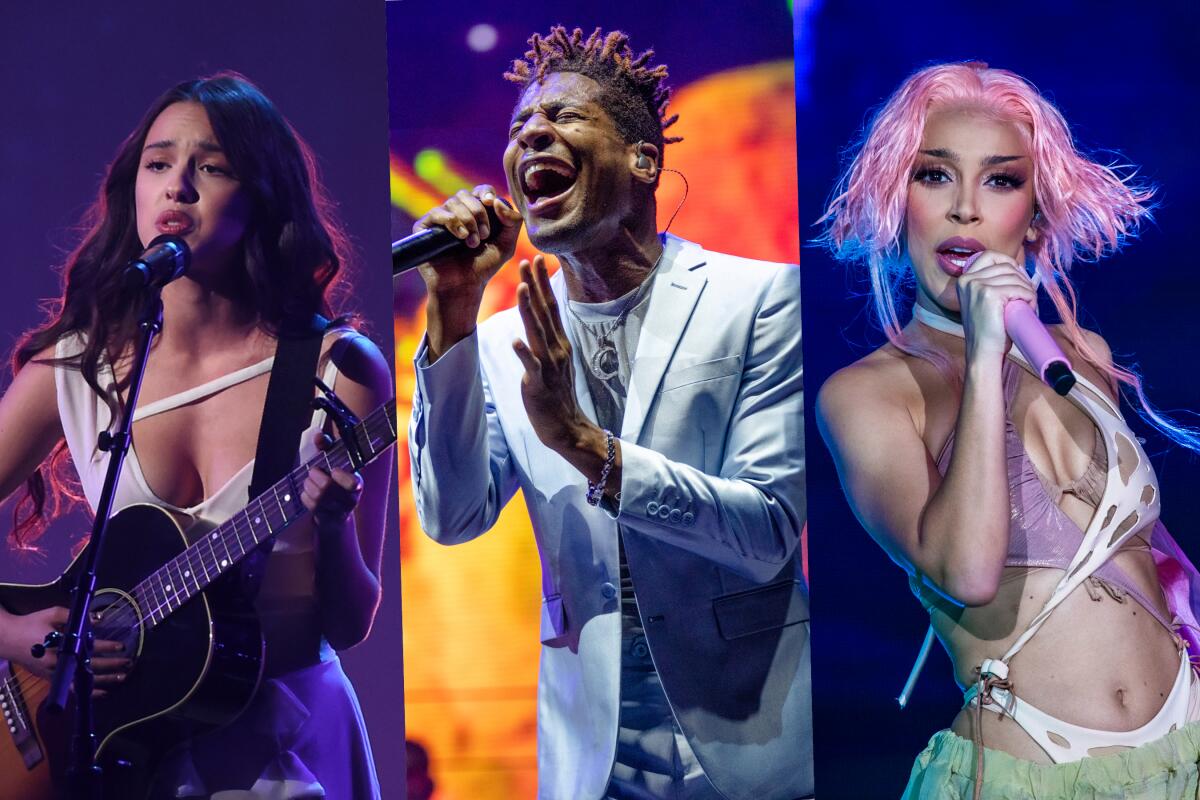
‘Colbert’ bandleader Jon Batiste leads the field with 11 nominations; Tony Bennett, Olivia Rodrigo, Doja Cat, Justin Bieber and H.E.R. will vie for top prizes.
- Share via
Seventy-seven years separate the oldest and the youngest artist nominated for the flagship prize at the 64th Grammy Awards, nominations for which were announced Tuesday morning by the Recording Academy.
At the upper end: 95-year-old Tony Bennett, who earned a nod for album of the year with “Love for Sale,” his and Lady Gaga’s collaborative tribute to the music of Cole Porter. And at the lower: 18-year-old Olivia Rodrigo, in the hunt for the same coveted award with her smash pop debut, “Sour.”
The 2022 Grammy nominations, in 86 categories
The three-quarters of a century between the two singers is the largest age spread in Grammys history — and yet it’s far from the only example of the academy’s eagerness to anoint new stars even as it celebrates established talent. A year after the music industry’s most prominent trade group triggered fierce criticism when it thoroughly snubbed the Weeknd — in the process raising widespread suspicions about backroom vote-rigging — the academy took something of a let’s-satisfy-everybody approach with nominations for the annual ceremony, set to take place Jan. 31 in downtown Los Angeles at Staples Center (which by then will be called Crypto.com Arena).

In album of the year, nominees beyond Rodrigo and the Bennett/Gaga pairing include Justin Bieber’s “Justice,” Doja Cat’s “Planet Her,” Billie Eilish’s “Happier Than Ever,” Lil Nas X’s “Montero” and Taylor Swift’s “Evermore” — all commercial blockbusters with strong online followings — along with H.E.R.’s “Back of My Mind,” “Donda” by the endlessly controversial Kanye West and, most surprisingly, Jon Batiste’s “We Are.” The Louisiana-born jazz and soul artist, familiar to many as the bandleader on “The Late Show With Stephen Colbert,” is the most nominated act for the 64th Grammys, with 11 nods in categories including traditional R&B performance, American roots song, improvised jazz solo and score soundtrack for visual media (for his work on the Pixar movie “Soul”).
Other acts with multiple nominations include Bieber, Doja Cat and H.E.R. (each with eight) and Eilish and Rodrigo (each with seven).
For record of the year, Rodrigo’s Gen Z power ballad “Drivers License” and Bennett and Gaga’s odd-couple rendition of “I Get a Kick Out of You” will compete against hit singles by streaming powerhouses such as Bieber (“Peaches”), Doja Cat (“Kiss Me More”), Eilish (“Happier Than Ever”) and Lil Nas X (“Montero (Call Me By Your Name)”) — as well as Silk Sonic’s throwback Philly-soul jam “Leave the Door Open” and Abba’s “I Still Have Faith in You,” from the veteran Swedish group’s first album in 40 years. Also in the mix: Batiste’s “Freedom” and “Right on Time” by the old-soul Grammys fave Brandi Carlile — though not BTS’ chart-topping “Butter,” an omission sure to be seized upon by the K-pop boy band’s ultra-devoted fan base. (“Butter” is nominated for pop duo/group performance.)

Song of the year — a songwriter’s prize, versus record of the year, which goes to performers and producers — has “Drivers License,” “Montero (Call Me By Your Name),” “Kiss Me More,” “Peaches,” “Leave the Door Open” and “Happier Than Ever” against Ed Sheeran’s “Bad Habits,” H.E.R.’s “Fight for You” (which won an Oscar earlier this year after it appeared in “Judas and the Black Messiah”) and a pair of tunes co-written by Carlile: “Right on Time” and “A Beautiful Noise,” the latter of which she recorded last year as a get-out-the-vote anthem with another perennial Grammys act, Alicia Keys.
A nod for Rodrigo for best new artist makes her the 13th performer in Grammys history to be nominated for all four major awards in a single night; Eilish, the most recent along with Lizzo, actually swept the big categories in 2020. Rodrigo’s competition includes Eilish’s brother, Finneas, who recently undertook a solo career; rappers Saweetie, Baby Keem and Australia’s the Kid Laroi; rock acts Glass Animals and Japanese Breakfast; singer-songwriter Arlo Parks; country star Jimmie Allen; and Arooj Aftab, a 36-year-old Pakistani composer and singer whose song “Mohabbat” made former President Obama’s summer 2021 playlist. (Obama himself is up for spoken word album along with Dave Chappelle, Don Cheadle and LeVar Burton.)
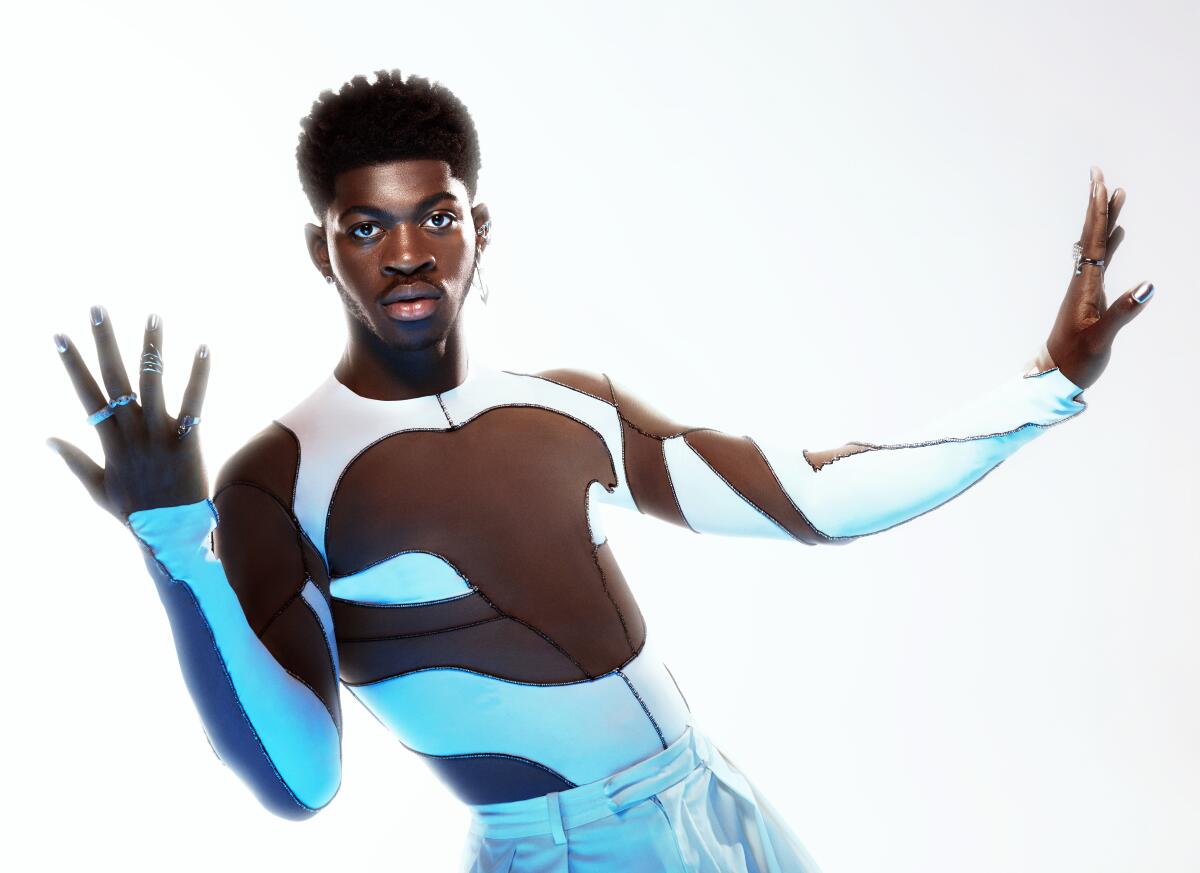
The 64th Grammys are the first in which the four major categories feature 10 nominees apiece, up from eight for the last few years. In an interview, Recording Academy CEO Harvey Mason Jr. said that more than 21,000 recordings had been submitted for consideration by the group’s approximately 11,000 voting members and that “we wanted to provide the opportunity for as many artists to be represented as possible.”
The shift wasn’t announced in advance, which Mason framed as indication of the academy’s “acting quickly, with a bias for action.”
“We didn’t want to wait, and that’s not something we’ve always been known for,” he said, acknowledging the stick-in-the-mud reputation of a group that made waves nearly two years ago when it ousted Mason’s predecessor, Deborah Dugan, after she raised concerns about voting irregularities and a toxic boys-club atmosphere. “But it’s something we’re proud of now. We’re listening, we’re learning, we’re asking.”
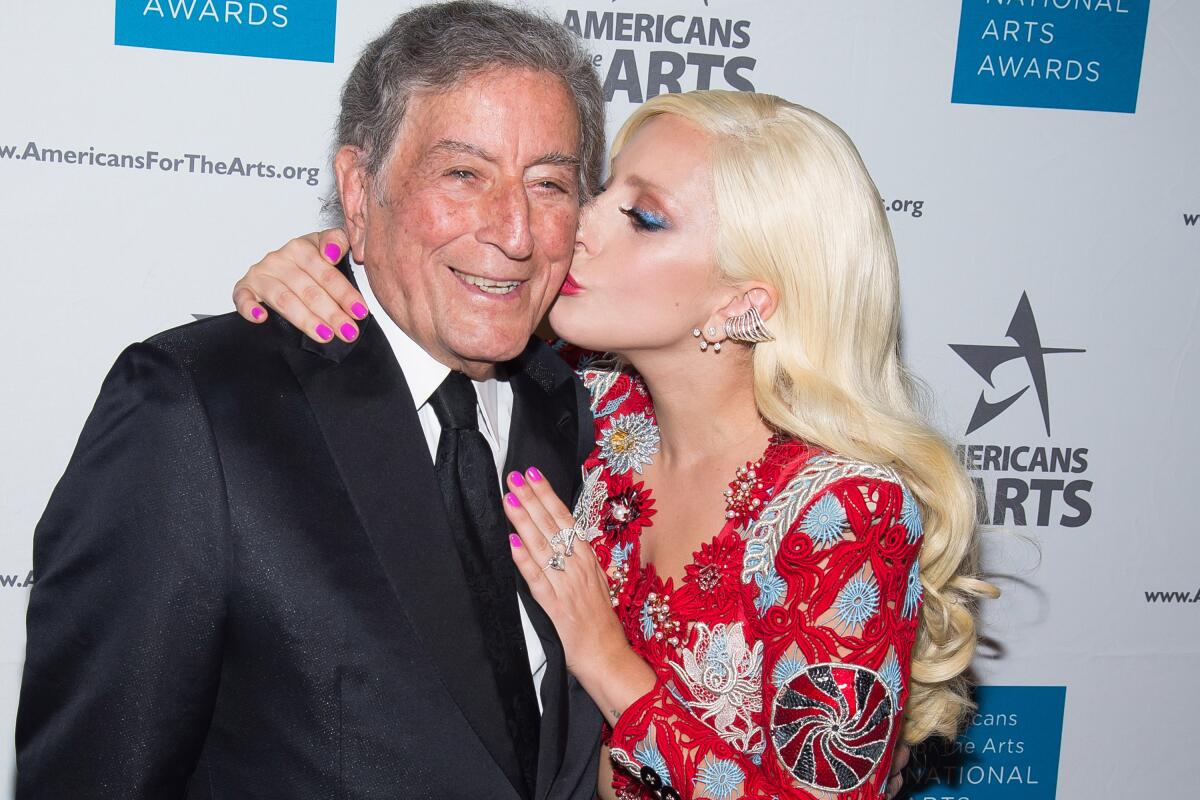
Indeed, this slate of nominees is also the first in decades, the academy says, not shaped by secretive committees of unnamed insiders that historically oversaw — and sometimes amended — voters’ first-round choices. Following a public outcry sparked by Dugan and the Weeknd, the latter of whom accused the academy of being “corrupt” in a viral tweet after his blockbuster “After Hours” album failed to score a single nod, the group announced in April that it had eliminated its so-called nominations review committees and pledged to run a clean vote going forward. (The Weeknd has said he declined in protest to submit his latest work for Grammys consideration, though he is up for the melodic rap performance award with his appearance on West’s song “Hurricane.”)
Mason said the change elicited “mixed emotions” among academy members, some of whom felt the committees “had great purpose in making sure there was balance in the music represented and that it wasn’t just a popularity contest.” He added that this year’s results “have started to prove our hypothesis” that the academy — long known as a bastion of old-white-guy values — is successfully expanding and diversifying its membership; it says it invited more than 2,700 recording professionals to join this year and that nearly half were women, half people of color and more than half people under the age of 40.
Mason’s hunch bears out in some categories — rap album, for instance, was filled by past-their-prime MCs at the 63rd Grammys, but this time, it recognizes work by vital acts such as Drake, J. Cole and Tyler, the Creator. The country album category feels similarly well informed, with wide-ranging nominations for Mickey Guyton, Miranda Lambert, Brothers Osborne, Sturgill Simpson and Chris Stapleton. (Morgan Wallen, the young country superstar caught on video early this year using the N-word, received no nominations.)
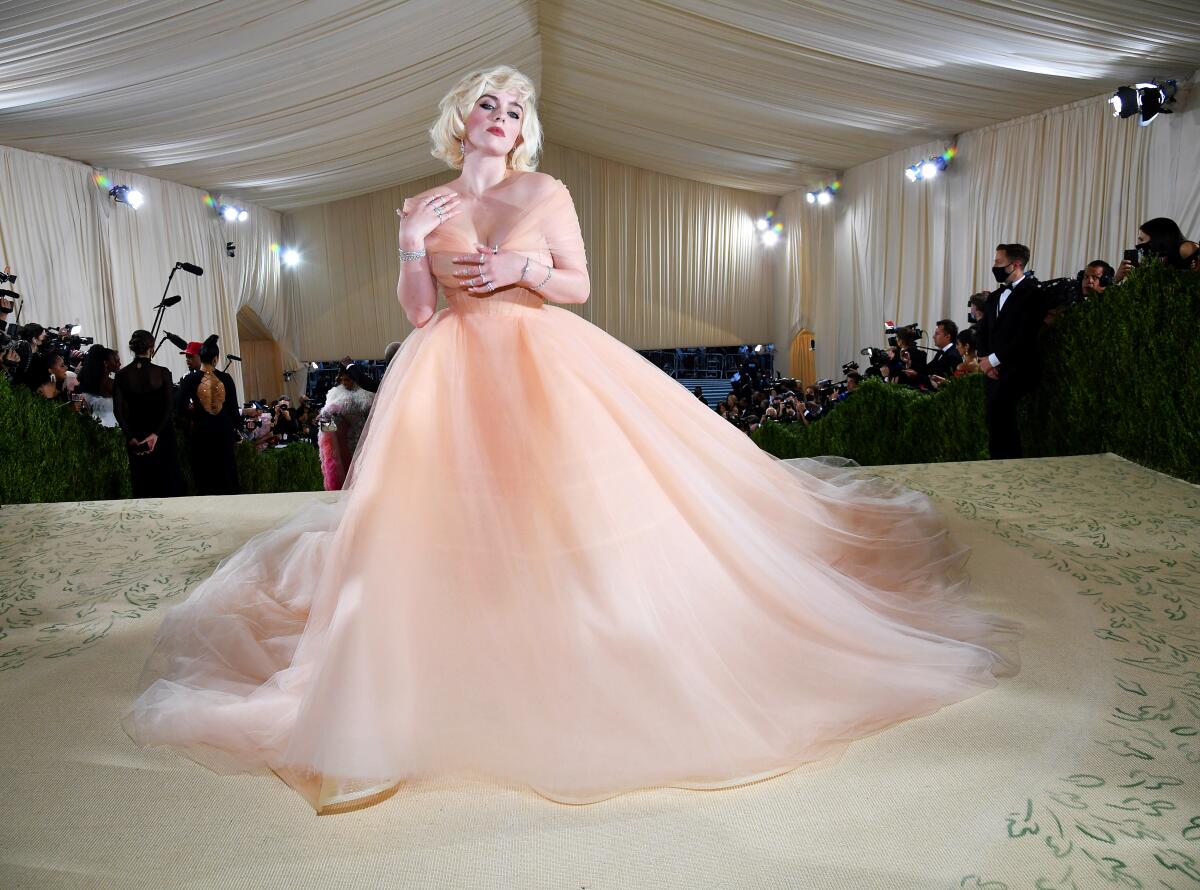
Yet plenty of go-to Grammy acts fared as well in these nominations as in recent years: As half of Silk Sonic with Anderson .Paak, Bruno Mars is up for his sixth record of the year award — only Frank Sinatra and Beyoncé have been nominated more times — while Eilish could become the first artist to win that category three ceremonies in a row. Paul McCartney and Foo Fighters both earned multiple nominations in the rock categories; Jay-Z, with nods for three awards for his appearances on songs by Kanye West and DMX, is now the most nominated individual in Grammys history with 83.
Other proven faves were only lightly decorated, though, including Swift, who earned just a single nomination, and Kacey Musgraves, whose song “Camera Roll” was nominated for two country awards but whose LP “Star-Crossed” — the follow-up to 2018’s Grammy-winning “Golden Hour” — was overlooked in the general categories. (Last month, the president of Musgraves’ record company set off a spirited discussion about the academy’s taxonomical processes when she wrote a letter to Mason complaining that “Star-Crossed” had been barred from competition in the country album category ostensibly because it wasn’t country enough.)
Adele, a reliable success story at the Grammys anytime she’s present, released her new album, “30,” after the eligibility window of Sept. 1, 2020, to Sept. 30, 2021.
As for January’s ceremony, Mason said he’s “excited about having audience members back in seats” after the 63rd Grammys, which, in accordance with COVID-19 protocols, combined live and prerecorded performances in a crowd-free setting in and around the L.A. Convention Center.
“We’ll do something to make sure artists are protected,” Mason said. “But it’s definitely going to be a different show than the last one — closer to the show that we’ve had in the past.”
More to Read
The biggest entertainment stories
Get our big stories about Hollywood, film, television, music, arts, culture and more right in your inbox as soon as they publish.
You may occasionally receive promotional content from the Los Angeles Times.
